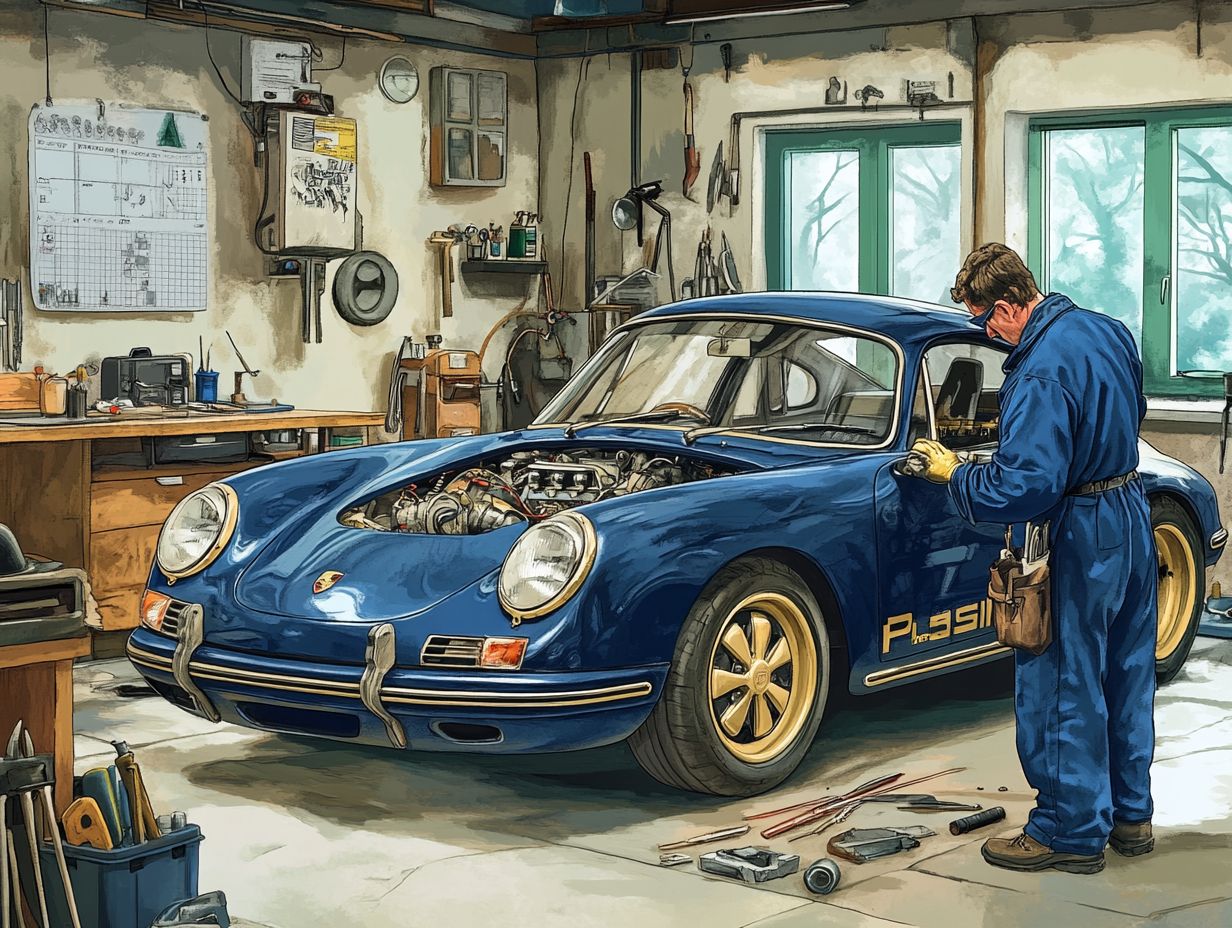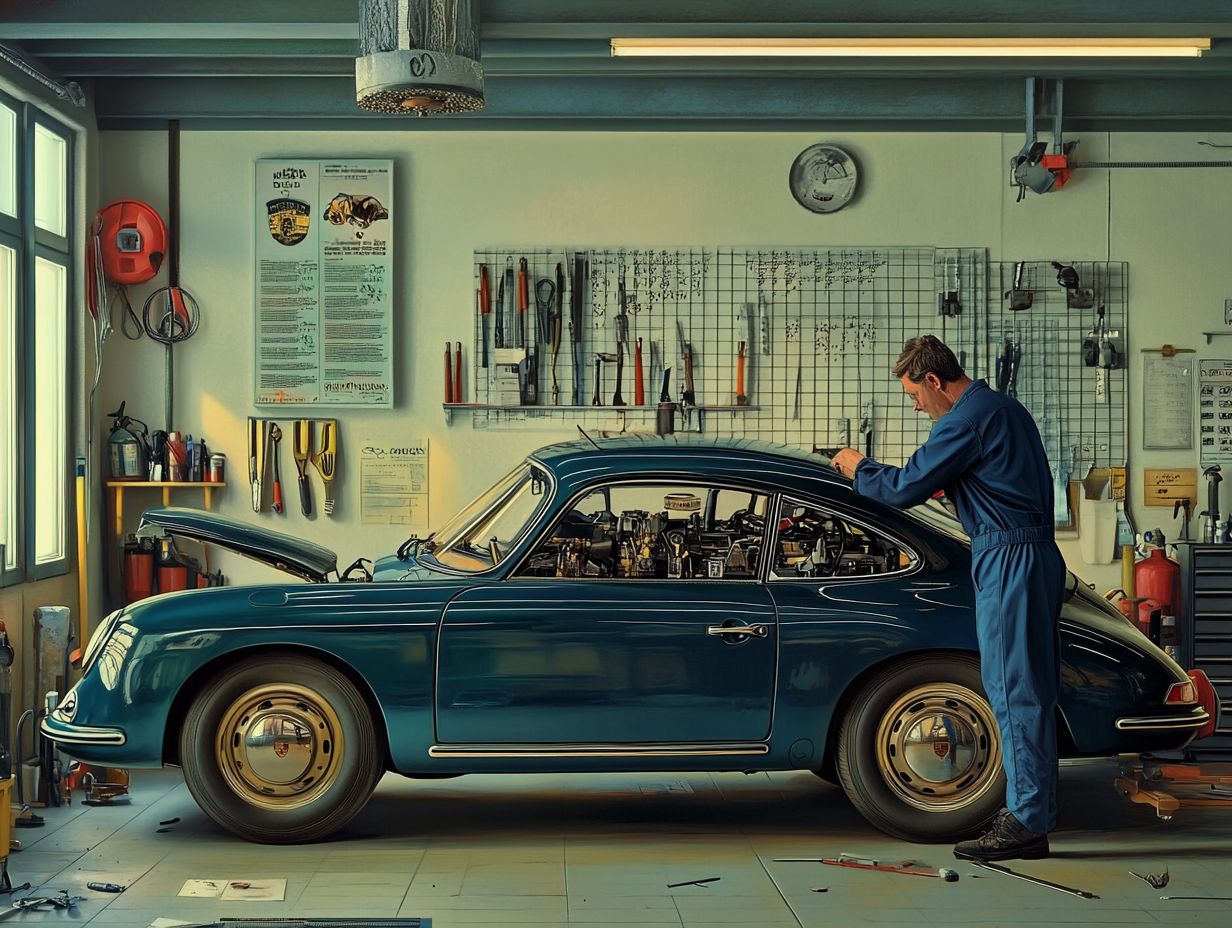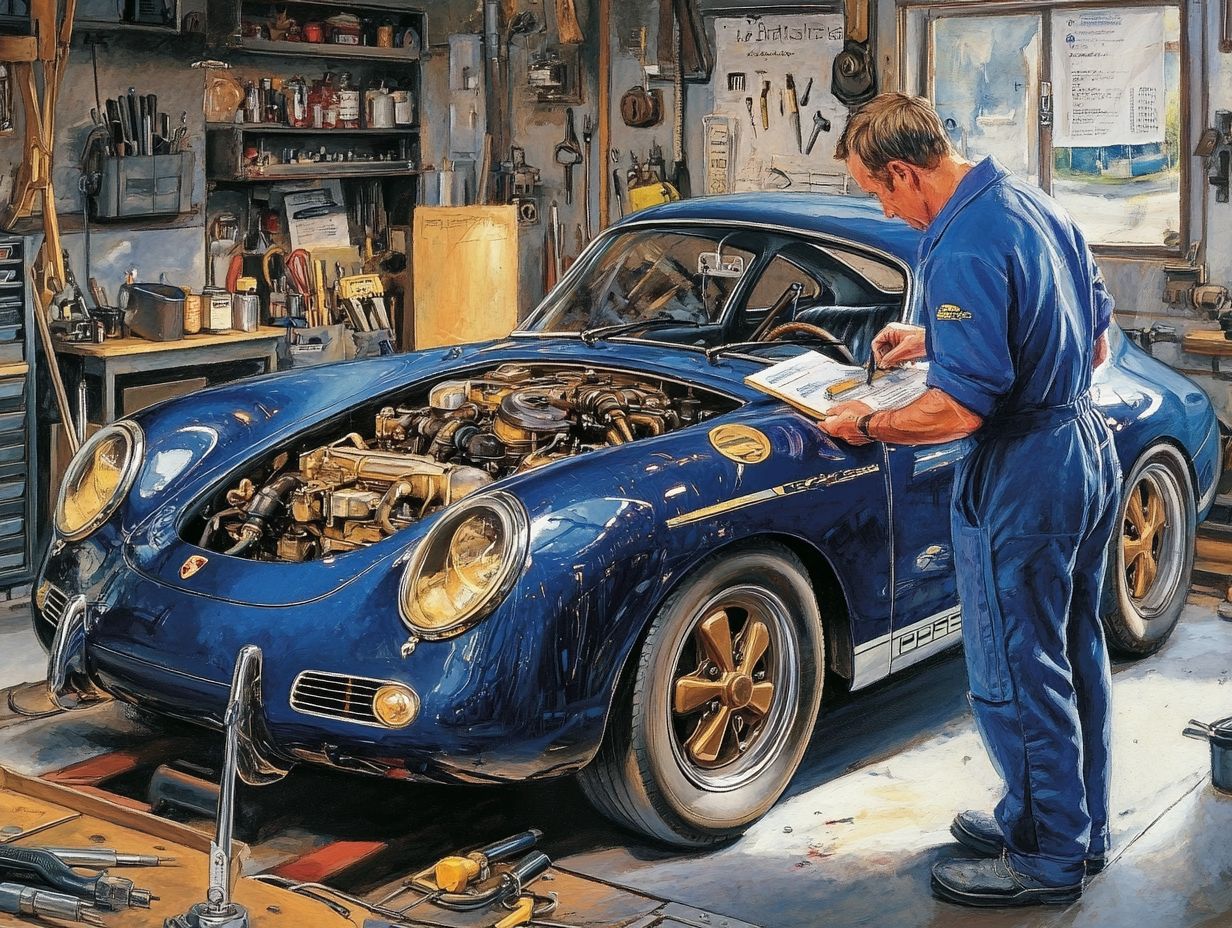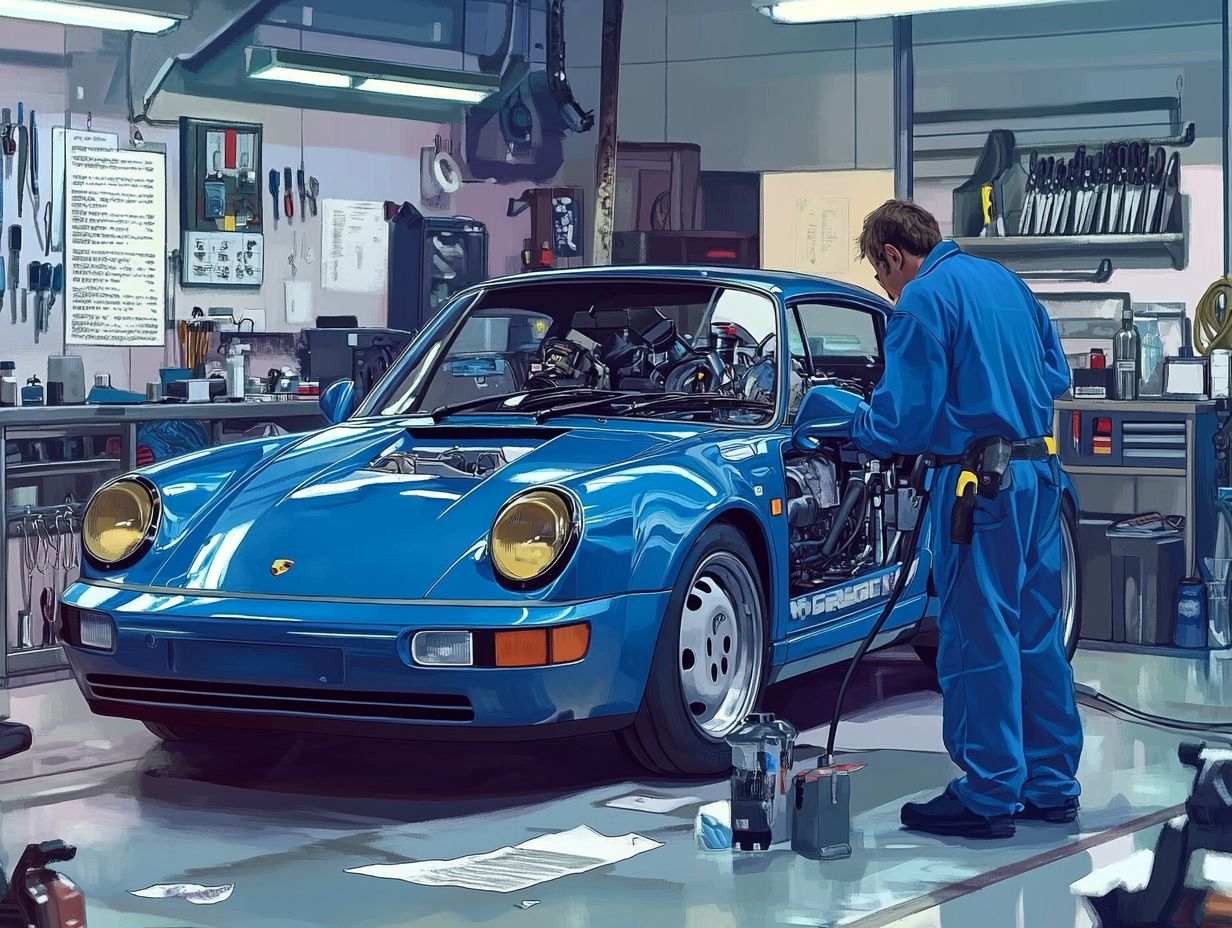Are Porsche Expensive to Repair?
Owning a Porsche is definitely a dream for a lot of us, but let’s be real—the thrill of driving these luxury sports cars often comes with some pretty steep repair bills.
I’ve learned that understanding what influences Porsche repair costs—like the model type and how severe the damage is—can really help me manage my expenses better.
This guide dives into common repair issues, shares some tips for saving on maintenance, and talks about when DIY repairs might actually be a good idea.
Whether you’re a die-hard Porsche enthusiast or just getting started, this info is here to help you keep your prized possession in top shape without emptying your wallet.
Factors that Affect Porsche Repair Costs

Owning a Porsche is pretty exciting, but I’ve learned that understanding what influences repair costs is a key part of the experience—especially for someone who loves luxury cars.
These stunning vehicles, celebrated for their performance and elegance, come with their own set of repair and maintenance requirements. I’ve found that things like the specific Porsche model I have, how severe any damage is, parts availability, and even local labor rates really affect the overall expenses.
Plus, looking into the reliability ratings of different Porsche models gives me some insight into potential long-term repair costs, which is super helpful when considering my financial investment in these high-performance beauties.
Type of Porsche Model
The type of Porsche I own really impacts my repair costs, especially since luxury and performance vehicles have their own unique needs and expenses. Whether it’s the classic 911 or the more modern Cayenne or Macan, each model comes with its own set of parts and service requirements that can really influence how much I spend on maintenance.
Take the 911, for example. It’s known for its high-performance engine, so I find that it often needs more frequent—but specialized—service because of its intricate engineering and focus on speed. This can definitely drive up my repair costs.
On the other hand, the Cayenne is still a luxury SUV but tends to have lower routine maintenance costs for things like brake replacements and tire rotations. That said, it can get a bit pricier when it comes to repairs related to its advanced all-wheel-drive system.
Then there’s the Macan. Its compact design typically means less expensive parts, so everyday repairs don’t hit my wallet as hard.
All in all, understanding these differences helps me anticipate the financial commitment that comes with maintaining these high-end vehicles.
Severity of Damage
The severity of damage to my Porsche really affects repair costs, deciding whether I’m just dealing with simple routine maintenance or facing some serious repairs. For example, little things like replacing brake pads don’t usually set me back too much, but when it comes to engine or transmission issues, the bills can add up fast with parts and labor.
It’s super important for me to understand how different levels of damage translate into repair expenses. Routine maintenance usually focuses on keeping things reliable, using less specialized labor that won’t empty my wallet. On the flip side, when major repairs are needed, I’ve got to call in the experts and use quality parts, which can really stretch my budget.
Insurance is a big player in all this, covering those hefty damages that could otherwise hit my finances hard. By getting a good grasp on these factors, I can prepare better for any potential repairs and make smarter decisions about my insurance coverage, ensuring I find a balance between premium costs and protection against those unexpected expenses.
Common Repairs for Porsches
Owning a Porsche is such a thrilling experience, but I’ve learned that, like all luxury cars, they need some TLC to keep them running smoothly.
I’ve come to realize that engine issues, transmission problems, and electrical system hiccups are some of the common repairs I might face. These repairs often require specialized tools and expert mechanics, which can be quite the adventure in itself when it comes to diagnostics and service.
Engine and Transmission Issues

Engine and transmission issues are some of the biggest headaches I face as a Porsche owner. They can really impact the performance and reliability of these high-end machines. With the precision engineering that goes into Porsches, any hiccup in engine performance or transmission functionality can end up being both costly and complicated to fix.
For example, I’ve heard about oil leaks from faulty gaskets and timing chain problems that can lead to some serious engine damage if I don’t catch them in time. Then there are the transmission issues, like erratic shifting or fluid leaks, which can really mess up my driving experience and even affect safety.
To avoid these potential nightmares, I make it a point to prioritize regular inspections and maintenance. This way, I can spot any issues early and tackle them before they escalate. Taking this proactive approach not only helps keep repair costs down but also protects my car’s overall performance, ensuring I get to enjoy that exhilarating driving experience Porsches are known for.
Electrical System Problems
Electrical system problems in my Porsche can really throw a wrench in the works, affecting everything from performance to overall reliability. With modern luxury cars being so complex, diagnosing and repairing these electrical components often calls for specialized training and tools to make sure everything runs smoothly.
I often find myself dealing with annoying issues like erratic sensor readings, flickering lights, and entertainment systems that decide to act up out of nowhere. It’s beyond frustrating and can leave me scratching my head. These problems require a deep understanding of the car’s intricate wiring systems and onboard electronics, which makes it tough for someone like me to figure out what’s actually going wrong.
That’s why I know it’s essential to turn to expert mechanics who have advanced diagnostic tools. They not only have the skills to track down these tricky faults but also leverage cutting-edge technology to perform thorough assessments. This way, I can get a comprehensive fix that brings my vehicle’s performance and reliability back to where it should be.
Ways to Save on Porsche Repair Costs
As a Porsche owner, I know that finding ways to save on repair costs while keeping my car’s performance up to par can really change the game when it comes to overall ownership expenses. I make it a point to stick to regular maintenance and inspections because they can help me avoid those hefty repair bills later on.
Plus, I’ve found that using high-quality aftermarket parts can lead to some solid savings without compromising on reliability.
Regular Maintenance and Inspections
Regular maintenance and inspections are super important for me as a Porsche owner. They really cut down on those unexpected repair costs that can sneak up on you if you let things slide. I like to set up a consistent schedule for oil changes, brake repairs, and overall vehicle check-ups to keep my Porsche in top shape.
This proactive approach doesn’t just boost performance and safety; it also makes sure that key parts like the transmission and suspension get the attention they need when they need it. By sticking to those service intervals, I can catch minor issues early on and avoid the pricey repairs that come from ignoring bigger problems.
Plus, regular inspections help me spot wear and tear before it turns into a major headache, extending my vehicle’s lifespan in the process.
For anyone like me who’s committed to maintaining their investment, it’s pretty clear that a little systematic upkeep goes a long way toward long-term savings and a more reliable driving experience.
Using Aftermarket Parts

Using aftermarket parts can be a smart way for me to manage repair costs without sacrificing the performance of my Porsche. Sure, genuine parts are often linked to luxury vehicles, but I’ve found that high-quality aftermarket options can be a more affordable alternative for common repairs and even performance upgrades.
I’ve noticed that many Porsche owners, myself included, have discovered these components not only meet but sometimes exceed factory specifications. It’s a great mix of cost-effectiveness and enhanced functionality.
Of course, it’s crucial to navigate the market carefully since the quality of aftermarket parts can vary a lot. I’ve seen customer reviews that highlight both the impressive performance upgrades and the occasional letdowns with subpar products. This really emphasizes the need for me to do thorough research and choose reputable suppliers.
Ultimately, finding that sweet spot between affordability and reliability can lead to a satisfying experience and optimal performance.
When to Consider DIY Repairs
As a Porsche owner, I’ve found that knowing when to tackle DIY repairs can be a real game-changer, especially for simple maintenance tasks that can save me some cash.
Basic things like oil changes or swapping out brake pads are often doable on my own with the right tools. It really cuts down on my need to run to a mechanic for every little issue that pops up.
Simple Maintenance Tasks
I love tackling simple maintenance tasks like oil changes and brake pad replacements, especially when it means saving some cash on repairs for my Porsche. These jobs are pretty straightforward, but they do require a bit of attention to detail and a basic understanding of how automotive parts fit together to get it right.
To kick off my maintenance journey, I always make sure to gather the essential tools—things like a torque wrench, jack stands, and oil filter wrenches. Having a clean workspace is key, and I don’t forget my safety gear, like gloves and goggles, to keep things safe while I’m working on these high-performance machines.
When I’m replacing brake pads, I make it a point to ensure the caliper is securely positioned. It’s all about performance and safety, after all. Sticking to a regular maintenance schedule not only helps extend the life of my car but also keeps it running reliably on the road.
Safety Considerations
When I think about tackling DIY repairs on my Porsche, safety is always at the top of my list. Sure, there are plenty of maintenance tasks I can handle at home, but it’s super important for me to know my limits and when to call in the experts. I definitely don’t want to compromise my car’s reliability.
I make sure I’m properly equipped with the right tools and protective gear because even what seems like a simple fix can turn into a serious accident if I don’t handle it carefully. Some parts of a Porsche require a level of knowledge and understanding about the car’s engineering that I may not have. I’ve learned that making mistakes can not only jeopardize my safety and that of my passengers but can also mess with the car’s overall performance.
In those critical moments, I remind myself to recognize when an issue is beyond my skill level. Not only does this prevent any further damage, but it also keeps my vehicle in line with safety regulations.
Frequently Asked Questions

Are Porsche Expensive to Repair?
It depends on the specific model and the type of repair needed. Some Porsches can be more expensive to repair than others.
What factors can affect the cost of repairing a Porsche?
The age of the vehicle, the availability of parts, and the extent of the damage can all impact the cost of repairing a Porsche.
Is it more expensive to repair a Porsche compared to other luxury car brands?
Porsches are typically more expensive to repair than other luxury car brands due to their high-performance components and specialized parts.
Are there any ways to save money on Porsche repairs?
Regular maintenance and addressing potential issues early on can help prevent costly repairs in the long run. Additionally, sourcing parts from third-party suppliers and finding a reputable independent mechanic may also help save on repair costs.
Does the warranty cover all repairs for a Porsche?
No, the warranty does not cover all repairs for a Porsche. It typically only covers defects in materials or workmanship, and may have limitations and exclusions.
Can I get an estimate for Porsche repairs before bringing my car in?
Yes, most reputable repair shops will provide an estimate for Porsche repairs. It’s important to communicate any concerns or specific issues you may be experiencing with your vehicle to ensure an accurate estimate.
